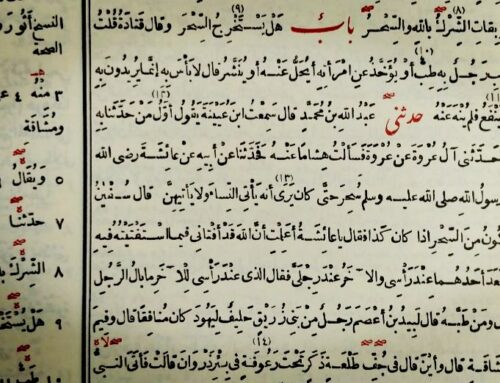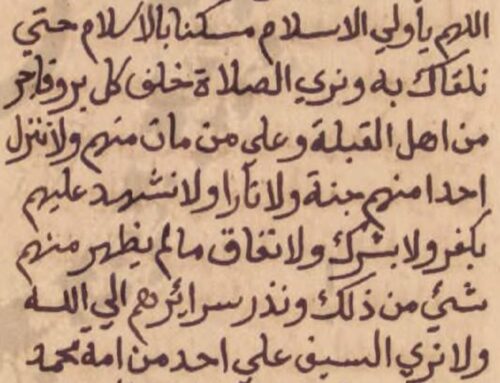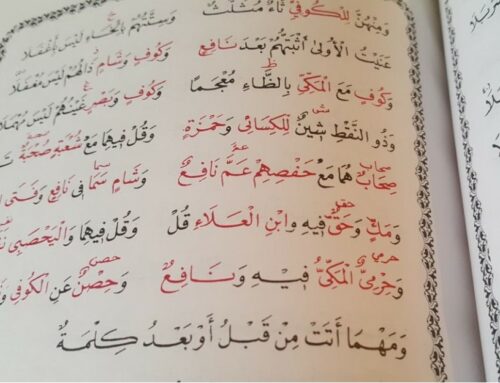By Mufti Rasheed Ahmad Fareedi
Translated by Javed Iqbal
[Translator’s Foreword: Hereunder is a translation of a concise treatise Husn-i-Qira’at par Ta’reef ki No’iyyat, authored by Mufti Rasheed Ahmad Fareedi (hafizahullah), a teacher at Madrasah Miftah al-Ulum (Taraj, India). The author has succinctly explained that it is permissible to express praise and acclaim a reciter (qari) of the Noble Qur’an for his good recitation, but this should only be done after the recitation has been concluded, and not at every instance of the qari pausing. He has specifically scrutinised the recent practice of the compere or M.C. at Qur’an recital gatherings expressing praise for the recitation during the pauses (waqf) in the recitation.
This treatise is extremely pertinent to one amongst many discrepancies the ever-growing trend of Qur’anic recitation gatherings, predominantly associated with Egyptian reciters, carries in its fold. Alongside being a breach of the etiquette of listening to the Noble Qur’an, the frenzied manner in which the audience usually applaud the qari in such gatherings is a symptom of entertainment being the primary objective in this heavily-promoted Qur’anic recitation scene.
Shaykh ‘Abd al-Qadir ‘Ata states:
“What we are witnessing in Egypt today in the gatherings of people around a qari who engages in talhin?[1] What we hear from the shouts and noises asking for a repetition affirms that these masses are not asking for a repeat of and are not delighted with anything but music and singing. As for the Qur’an, they are totally isolated from it. They scream with delight equally when they hear the verses of admonishment or the verses of reward. They make no difference between the verses talking about Hell and those talking about Heaven. In this act there is such disrespect for the Qur’an that calls for prohibition of such listening and attendance of such gatherings.” (Slippery Stone, pg. 270)
May Allah enable us to fulfil the rights of the Noble Qur’an, and make it a proof for us, not against us, on the Day of Judgement. Aamin.]
In the name of Allah, the Most Merciful, the Ever-Merciful.
Introduction
We praise Allah and send blessings on His Noble Messenger. To proceed:
There are many aspects of etiquette for the Noble Qur’an, one important aspect being to listen to its recitation attentively and remain silent. The command in the verse: “So when the Qur’an is recited, then listen to it and be silent that you may receive mercy”[2] denotes incumbency (wujub) in salah and during the sermon (khutbah). In other cases, where there is one person in a gathering who is reciting whilst others listen, listening carefully and remaining silent is a right of the Qur’an and an emphasised point of etiquette. It is for this reason that the Companions (may Allah be pleased with them) would listen very attentively whenever the Noble Prophet (peace and blessings be upon him) recited the Noble Qur’an to them. One on occasion, he recited the whole of Surah al-Rahman to them and they all remained silent. From this it is understood that it is a right of the Noble Qur’an to listen to it attentively and remain silent when it is being recited.
The Proof for Approving and Acclaiming a Good Recitation
It has been reported that the Noble Prophet (peace and blessings be upon him) listened to the recitation of the Noble Companions (may Allah be pleased with them) and also approved and praised them after they had recited.
In the famous incident of Sayyiduna Umar ibn al-Khattab (may Allah be pleased with him) taking Sayyiduna Hisham (may Allah be pleased with him) to the Noble Prophet (peace and blessings be upon him) and complaining that he was reading differently to the way Sayyiduna Umar (may Allah be pleased with him) had been taught, the Prophet (peace and blessings be upon him) first asked Sayyiduna Hisham (may Allah be pleased with him) to recite. After he had recited, the Noble Prophet (peace and blessings be upon him) said, “This is how it was revealed.” He then told Sayyiduna Umar (may Allah be pleased with him) to read, after which he said the same words: “This is how it was revealed.”[3] This was a case of approving differences in readings (qira’at).
The Noble Prophet (peace and blessings be upon him) heard the recitation of Sayyiduna Abu Musa al-Ash’ari (may Allah be pleased with him) and praised him afterwards, saying, “You have been granted one of the beautiful voices of Dawud.”[4]
Sayyiduna Abdullah ibn Mas’ood (may Allah be pleased with him) once recited Surah Yusuf to a gathering of people in Homs. One of the people (found to be drunk afterwards) objected to his recitation. Sayyiduna Abdullah (may Allah be pleased with him) said, “By Allah, I recited it to Allah’s Messenger (may Allah bless him and send peace on him) and he said to me, ‘You have read well (ahsanta).’”[5]
Both of these narrations show acclaim of a good recitation. In short, praising correct and good recitation is established from authentic narrations.
In 1395 AH (1975 AD), a large conference presided by the great hadith scholar Hazrat Mawlana Habib al-Rahman A’zami (rahimahullah) was held in Jamiah Islamiyah, Dabhel, upon the arrival of the Grand Shaykh of Azhar (Cairo, Egypt). The conference was initiated with the recitation of the head qira’ah teacher, Hazrat Mawlana Qari Ahmadullah Bhagalpuri (may his shadow be lengthened). After the recitation, the Grand Shaykh of Azhar said, “You read well (ahsanta).”
The Correct Timing for Praise and Maintaining Distinction from Poetry Recitals
From the above hadiths and also the incident cited, it is clear that approving or praising the reciter’s good recitation should be at the conclusion of the recitation. However, if the listener is genuinely affected by the good recitation and ends up saying “Allah” or “SubhanAllah” or “MashaAllah” [or similar phrases] when the reciter pauses, there is no harm in this.
[What the author has noted here as exceptional circumstances is clearly different to what was quoted from Shaykh ‘Abd al-Qadir ‘Ata in the foreword.]
Furthermore, it is permissible to point out mistakes during the recitation for the sake of correcting, as is the case when one is teaching or studying.
But when the objective is merely to recite and listen to the Qur’an, it is contrary to [the Qur’anic order of] insaat, i.e., remaining silent, to say words of praise, encouragement and supplication [for the reciter] during the recitation. It is perhaps for this reason that even forbidding wrong is prohibited during the sermon (khutbah).
Today, in the gatherings of Qur’anic recitation, when the reciter pauses during his recitation, and at times even before he has paused, the compere or M.C. begins showering praise and encouragement very openly on the microphone, and all of this is done purposefully and very artificially.
It seems this style of praise has been imported from poetry recitals, in which poems and sonnets are read. As the meanings of the poems are generally understood by the listeners, and out of being elated by the poet’s enthralling poetry, accolades of praise are received as soon as the verse of poetry has finished, and at times, even before it has been completed. The poet also looks forward to receiving such praise.
This behavior is considered praiseworthy and a mark of respect in poetry recitals. However, the Qur’an is the word of Allah and gatherings of Qur’anic recitation should be distinct from poetry recitals. The decorum of Qur’anic recitation is to listen attentively and remain silent whilst it is being recited. Even the moments in which the reciter pauses are considered part of the overall recitation. For this reason, if one cannot hear the sound of the recitation, remaining silent is nonetheless necessary. Thus, the practice of praising, encouraging and supplicating for the reciter, as is becoming customary, is a breach of etiquette and a digression from the way of the pious elders. Moreover, the prohibition of rowdiness during the recitation is also established from the verse: “And those who disbelieved said, ‘Do not listen to this Qur’an, and make noise during its recitation, so that you may overcome.”[6]
[From the above, the ruling regarding shouting takbeer, chants of praise when the reciter demonstrates his breath-power or his command over tune (especially in the midst of a verse), and Mexican-wave style motions, is quite evident]
Refraining from the Customary Manner of Praising
One of the harms of this customary manner of praising and encouraging is that as soon as one hears the loud acclaim of the M.C., the effect of the recitation, which was divinely created in the heart and which was potentially a cause for further zeal towards the Qur’an and guidance, finishes immediately. Once the reciter carries on with his recitation and the audience listens attentively, once again a spiritual connection is made. However, the loud interjection of the M.C. when the reciter pauses overcomes the listeners’ condition yet again and they are deprived of the spirituality they should have experienced through listening to the Qur’anic recitation.
In conclusion, praise of the reciter’s recitation, and words of encouragement and supplication are permissible. However, this should be at the conclusion of the recitation and not before, and the manner of praising which is coming in vogue, similar to that of poetry recitals, should be stopped totally.
Allah knows best, and His knowledge is most complete and decisive.
Written by:
(Mufti) Rasheed Ahmad Fareedi
Madrasah Miftah al-Uloom, Taraj, Dist. Surat
8 Rajab al-Murajjab 1437 AH
[1] Reciting the Qur’an in musical intonations
[2] Qur’an, 7:204
[3] Bukhari 5041
[4] Bukhari 5048, Muslim 793
[5] Muslim 1387
[6] Qur’an, 41:26








Leave A Comment